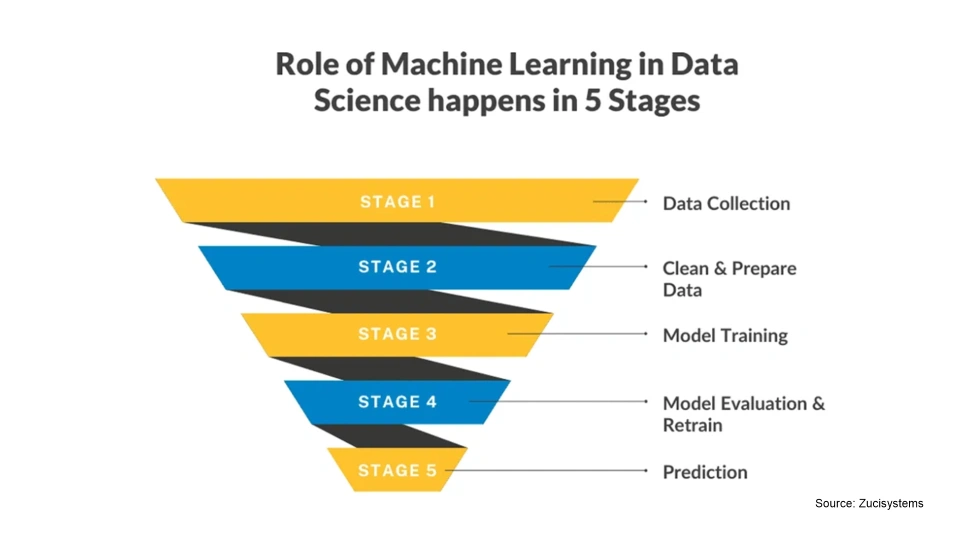
Data science has become one of the most prominent technologies and can be defined as the backbone of digital transformation that helps organizations unlock never-before-seen insights from huge amounts of data they generate. However, without leveraging machine learning, the true potential of data science might remain relatively untapped.
In short, we can say that machine learning is the engine that powers data science in the modern-day industries, which not only makes systems descriptive but predictive, adaptive, and even autonomous. With the global data volume estimated to reach over 181 Zettabytes by 2025, the role of machine learning in data science will be higher than ever.
From Descriptive to Prescriptive: Transforming the Role of Data Science
Traditionally, data science only focuses on descriptive analysis, which answers what happened. But leveraging machine learning changes the game and helps organizations answer what will happen next.
For example,
This shows how important muscle learning is in driving modern data science operations.
Automating Data Science Processes
Data science is undoubtedly the best technology we have today, but data preparation that includes cleaning, imputing, and feature engineering is often a messy and undesirable task. According to Forbes, data processing can take up to 60-80% of a data scientist's time. This is where machine learning based automation tools help by handling much of this grunt work.
Technologies like auto ML, streamlining, data preprocessing, model selection, and hyperparameter tuning help data scientists focus more on strategic work rather than mechanics. This democratization makes AI development easier, allowing non-technical professionals to leverage machine learning effectively.
Role Of Machine Learning Across Various Data Science Stages
Machine learning can be used to enhance nearly every stage of the data science process.

Let's understand this in detail
1. Data Collection
Machine Learning algorithms can streamline the data injection process from different sources using intelligent crawlers and anomaly detectors to ensure only high-quality and relevant data comes into the pipeline.
2. Data Cleaning
A lot of time is spent on data training, and therefore, using machine learning to automate this task can help with
3. Exploratory Data Analysis
Instead of manually testing hypothesis machines, learning models help find hidden correlations, clusters, and trains, as well as augmented visualization powered by machine learning helps status scientists understand meaningful features.
4. Data Modeling
This is the area where machine learning shines the brightest. Machine learning algorithms, from regression and decision trees to deep learning, help transform raw datasets into predictive or classification models. AutoML tools, then further speed up the training and optimization process.
5. Model Deployment
MLOps ensures models move from notebooks to production environments seamlessly. ML enables real-time inference, automated retraining, and scalable cloud deployment.
6. Monitoring and Continuous Optimization
Once deployed, models face concept drift with the changing real-world data. Adaptive learning techniques help systems self-update and keep predictions accurate over time.
Real-World Applications: How ML Makes the Difference?
1. Computer Vision: Seeing Beyond the Human Eye
Machine Learning helps to interpret visual data faster and more accurately than humans, be it medical imaging or autonomous driving. Convolutional Neural Networks (CNNs) have become the standard for image recognition and object detection.
2. Speech and NLP: Conversing in Human Language
Machine learning also powers the popular voice assistants like Siri and Alexa. Natural language processing (NLP) models power real-time translation, sentiment analysis, customer support automation, etc.
3. Recommendation Systems
Today, almost all online shopping apps or streaming platforms use recommendation engines. These models leverage behavioral data to improve engagement, retention, and revenue.
4. Anomaly Detection
In high-stakes industries like finance, cybersecurity, or IOT, machine learning models are used to detect anomalies, i.e., unusual activity that might otherwise go unnoticed, especially in operations like credit card fraud or machine failure.
Integration of Machine Learning with Cloud: Power Duo for Scale
Most of the modern machine learning models thrive in the cloud. A recent study found that 69% of machine learning workload runs on public cloud platforms, including:
32% on AWS SageMaker
27% on Azure ML
22% on Google Vertex
Cloud ML provides the following benefits:
The cloud has effectively turned ML into an on-demand utility.
Machine Learning- A Must for Companies
Machine learning has become a very important aspect of all businesses today. In fact, 78% of organizations are already using AI and machine learning in at least one of their business operations, according to McKinsey. Moreover, in high-tech industries, including healthcare, finance, and manufacturing, the AI and machine learning adoption rate is over 65%.
However, cultural resistance, lack of data maturity, and shortage of skilled data science and machine learning workforce are big challenges in adopting AI and machine learning for business operations. And organizations that fail to adopt machine learning are at greatest risk of falling behind their competitors in terms of efficiency, innovation, and customer experience.
The Future of Machine Learning and Data Science
Several key trends define the future of machine learning in data science, such as:
The global investment in machine learning is expected to go beyond US$500 billion, and hence, we can conclude that data science will evolve into a more predictive, automated, and ethical field.
The Future is Powered by Machine Learning
Machine learning is no longer just a component of data science; indeed, it makes data science more impactful. It has been transforming descriptive analytics into predictive insights, automating regular and time-consuming tasks, powering several real-world applications, and operationalizing insights at scale with MLOps and cloud integration.
All businesses today must acknowledge that the role of machine learning in data science strategy is not just about achieving efficiency but about future-proofing their competitive edge. Machine learning and data science are deeply integrated, and therefore, organizations must harness them fully to lead the next wave of digital transformation.
This website uses cookies to enhance website functionalities and improve your online experience. By clicking Accept or continue browsing this website, you agree to our use of cookies as outlined in our privacy policy.